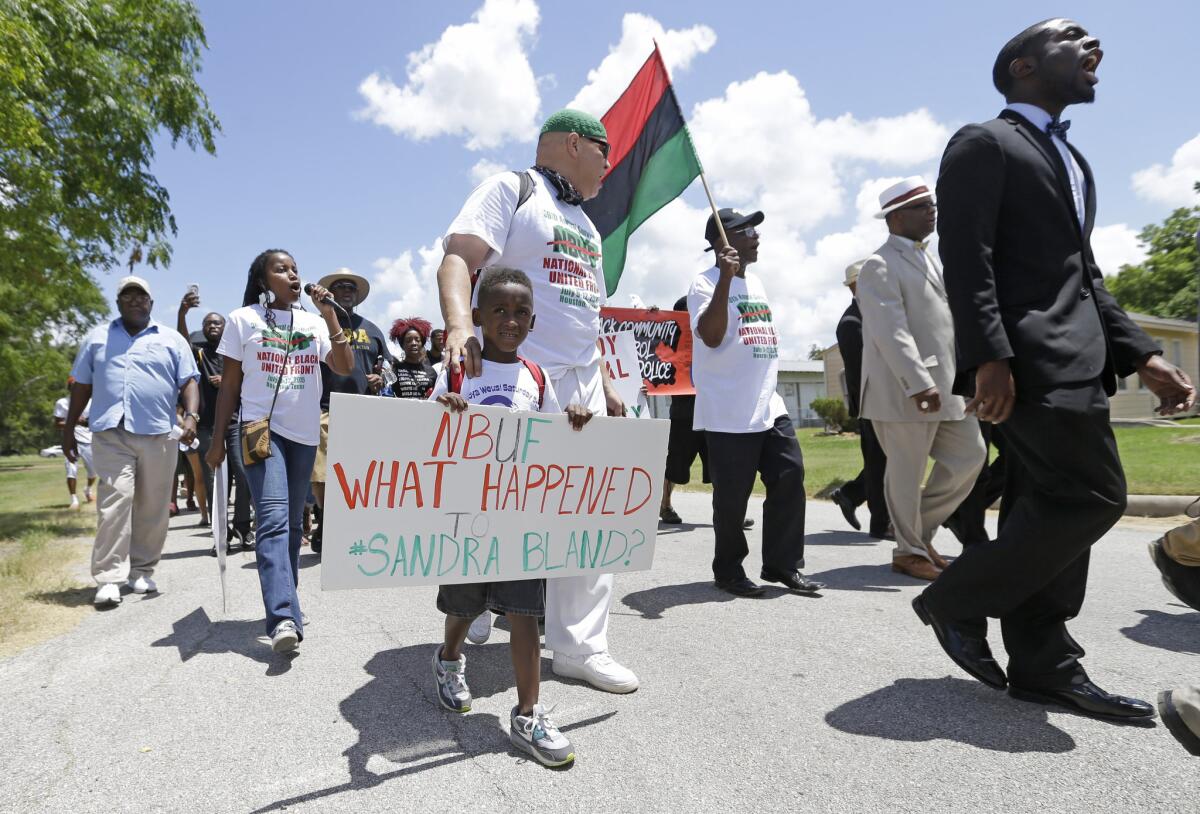#SandraBland inspires #IfIDieInPoliceCustody -- a somber collection of last words

Protesters march from Waller County Jail to the Waller County Courthouse in Hempstead, Texas, on Friday to protest the death of Sandra Bland, who was found dead in a jail cell this week.
- Share via
On Monday, a woman named Sandra Bland was found dead in a Texas jail cell, and officials declared that she had committed suicide by hanging. But her family didn’t believe what the police were saying, and neither did social media. By Wednesday, #SandraBland was a trending topic on Twitter.
And now the conversation has widened. Twitter users, most of them black, are rallying around a new hashtag: #IfIDieInPoliceCustody, which has become a somber collection of last words by users should they too be found dead under similar circumstances.
Social media has seen a similar trending hashtag in response to police killings of blacks. #IfTheyGunnedMeDown was born when mainstream news coverage of the fatal shooting of Michael Brown in Ferguson, Mo., last August suddenly seemed to take a negative turn. Specifically, media reports were often accompanied by photos that showed Brown scowling or making hand gestures, rather than more positive images such as his smiling high school graduation portrait.
In response, #IfTheyGunnedMeDown began trending among black users of social media. It was a meme with a sad punchline. On one side, an image of a young black person holding a liquor bottle or grimacing at the camera. On the other, a picture of the same person graduating college, serving in the military or playing with their children. The hashtag asked: Which image would the media use in their reports if I were killed by police?
It was a rhetorical question. The answer, according to social media, was that “they” – the media – would use the image that most suited the narrative of young blacks as criminals that deserved to die.
#IfIDieInPoliceCustody may seem to be a simple repeat of last year’s hashtag, but there’s something different here. Many of these tweets read like a last will and testament. Instead of questions, these are requests: Please take care of my parents for me, please use this picture of me, please start a protest in my name and don’t stop until you get justice:
Some asked that people investigate and question the circumstances of their death. Jamilah Lemieux, a writer and editor whose father is a retired police detective, wrote the following tweet:
“I was taught how to interact with the police from a young age,” Lemieux said in an interview. “It wasn’t about revering them or their position in the community, but about self-preservation. Sometimes this is at the cost of my dignity or my humanity.”
“I have a child,” Lemieux added. “And the idea that I could be taken away from her is something I think about constantly.”
Lemieux also argues, as other Twitter users have done in their #IfIDieInPoliceCustody tweets, that for black people, being polite or deferent to police is not a guarantee of safety. “I do take steps to ease the likelihood that a police officer will become violent,” she said, “but it has more to do with the police than it has to do with us.”
These are concerns that Lemeiux shares with the majority of tweeters using the #IfIDieInPoliceCustody tag. These also seem to be borne out by statistics. A study published by the Harvard Public Health Review based on data from 1969 to 2010 shows that black men are far more likely to die in encounters with police than white men. Statistics on black women are not nearly as readily available – which may speak to the concern among many tweeters that Sandra Bland’s story might slip through the cracks, as have the stories of other black women who died after an encounter with police.
Sandra Bland is not here to join this conversation. We will never know precisely what she would think about the movement that is building around her memory. But a brief clip from a video that Bland made in January has been circulating on Twitter. In it, Bland addresses the viewer:
“Social media is powerful," she says. "We can do something with this. If we want a change, we can really, truly, make it happen.”
Follow me @dexdigi for more on culture and online communities.
Sign up for Essential California
The most important California stories and recommendations in your inbox every morning.
You may occasionally receive promotional content from the Los Angeles Times.








